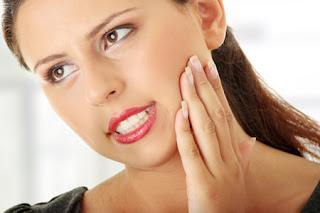Does sensitivity keep you from enjoying your favorite cold treat? Does a cup of coffee make your mouth cringe? You may be suffering from sensitive teeth. But what causes sensitive teeth and how can you fix it? Here are a few possible causes and suggestions to help you get started.
1. Exposed tooth roots - Many of us brush way too hard under the impression that harder means cleaner. It doesn’t. Brushing too hard can eventually wear away your gums leaving your tooth roots exposed. The tooth root has pores that lead to the nerve of the tooth. When these pores are exposed triggers like hot and cold have a much quicker access to the root causing discomfort or pain. Talk to your dentist. He may suggest a sensitivity toothpaste or mouthwash.
2. Tooth decay – Tooth decay can also cause sensitivity. The most common form of decay is cavities. A second form of tooth decay is cracking. Large fillings can lead to weakness in the rest of the tooth, providing the potential for cracking. Additionally, munching on too many hard treats like candy or ice can also lead to a crack. To fix the sensitivity, you would need to eliminate the decay. Schedule an appointment with your dentist to find relief from sensitivity caused by tooth decay.
3. Too much acid – Acid in the things we eat and drink can eventually wear away the enamel on teeth, leaving the dentin exposed. Without the enamel barrier, teeth can easily become sensitive. Your dentist will know how to help you minimize future acid erosion and protect the dentin already exposed.
4. Whitening agents – Over-whitening and working continuously to keep our pearly whites pearly can cause sensitivity. Bleach and other chemicals used in teeth whitening products can cause sensitivity throughout your mouth. The simplest solution may be to stop using the whitening product; or talk with your dentist about switching to different whitening methods, or using different product lines.
If you or any family members have further questions, please contact us and we would be happy to discuss any concerns. Why wait.......call today (512) 992-2822 or visit our website Rigby Advanced Dental.












